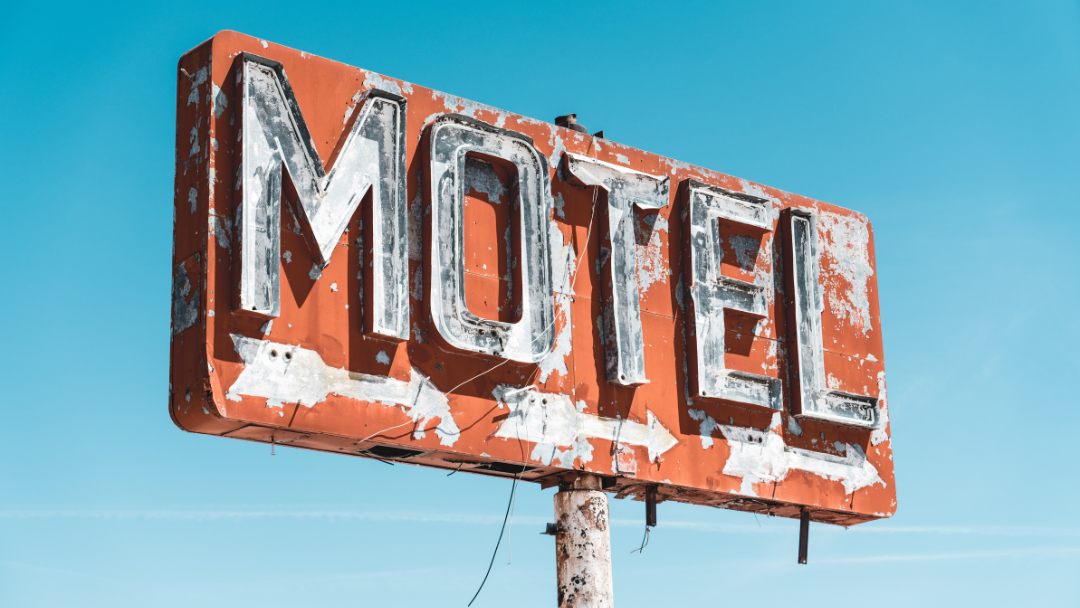WE ARE TWELVE WHEN WE SHARE OUR FIRST CIGARETTE ON THE BALCONY OF A POST-WAR BUDGET MOTEL. She wears her mother’s dress and I wear ill-fitting, low-rise jeans and together our thighs press between the wooden balusters, feet dangling, shoes free to drop like tiny bombs should we let them, should this be the day we first assert ourselves as shareholders in our great-great-great-great-granddaddies’ occupying force. But today we need them. Today we keep them on.
The air boils. Evening nears. Soon the heat will break, she says. She knows this because she has lived here long enough to know how the sun grows tired of whipping faces, the same faces, hour after hour, tinting pallid cheeks cherry red, beet red, russet. And how whatever slight pleasure the sun may derive from such facile abuse wanes as the moon draws near. She is twelve and she does not use these words, but that is her sentiment.
Behind us a door in the long succession of doors opens, closes with a bang, a click. We wait for a man or group of men to thrust some offhand remark in our direction, to whistle, to jeer, to drag a finger down our spines as if in search of an address, a phone number. Nothing comes. We are alone. We tug fistfuls of cheese puffs from a plastic container pinned between us, some oversized behemoth fished from a grocery store bargain bin hours before. Soon she pushes it back, leans back, drags her foot through the baluster, tugs a cigarette from her shoe. The lighter, she asks. Her hand extends. I pull a purple BIC from my own.
She lights it flawlessly, inhales with obvious familiarity. In her youthfulness, a still centered existence, she contents her lungs with a second puff, a third. At her fourth, she frees it from her lips and offers it to me. I breathe as I have seen her breathe. I feign confidence and yet fail with a cough. When my lungs release, her fingers meet my thigh and down it dredge a trail of sweat and orange dust.
Focus on me, she says.
I try again; a modest success. At my exhale, still lagging, still unsure, her hand releases and her palm seizes my knee. Into it her thumb drums a faint beat, against my femur, into its base, into the distal extremity of the bone that years before refused to grow for me, rebuffing the harness they enlisted to connect it to my pelvis, to my hip, the way it does in nearly every other body. Sitting there, in that outdoor hallway we call a balcony, I first sense the disconnect. Her fingers tap into me, one two three, one two three, like mallets against their timpani, but the heads must be busted because it resounds from tibia to chest until the beat suspends and the fingers she so confidently presses lift to grip the cigarette.
Watch me, she says. Like this.
Below us children half our age scramble from the swimming pool wet with giggles and bellows. Their legs pump quickly, elbows jockeying again, again for a chance at the diving board on the pool’s edge. I hear them, and the subtle clap clap of the flimsy laminate and fiberglass, and the way their sheeplike bleats mix with the low hum from the motel sign just up the way. It advertises COLOR TV and NO VACANCY and I know this not from seeing it now but from noticing it then, an hour before, when we turned at a sharp divot in the road and abandoned our bikes alongside the few cars in that gravel drive. More cars fill it now. More people. I know this, too, only from the stirring voices down below, and the muted brays behind us, and the bed joints creaking like bicycle chains in tandem. A steady orchestra of life invisible to me because my eyes are trained on her, on the lips at my side, as was asked of me, as was urged.
Slowly, she says. Just like this.
Again she passes it. Again her hand on my knee. Easy puff, easy release.
In the distance two flags bash: one of the country, one of the state. Both tempered by the pole that holds them, one just below the other, looped and bound with rust-free clips and string. I think of them, and of the stick that she holds, of the tiny residuals of breath and spit and skin passed back and forth, back and forth, from lip to stick, and stick to lip, from lip to lip, and I think how odd to think such a thing, and odder still to be taken with such a feeling, to suddenly want more than the back and forth of a damp filter, more than the separate push and roll and crease and thrust, more than the easy rhythm of puff, release. I want movement. I want touch. I want lip on her lip but it is 2003 and I do not yet have the words for what this means, so I stare at her mouth, and I watch her lips, and somewhere just before us, just above, those flags whip and lash, whip and lash, their tips swaying as if toward a kiss, a caress, or some early, tepid abuse.
Heat breaks to darkness. Darkness breaks to night. Near us, from the highway, come the whirs of barreling trucks, and the drone of cicadas, and the howls of bobcats drifting as specters among desert shrubs. Nearer still, those groans from the rooms at our backs, and from the cracked windows on the floor below. There is yellow fog in the sky—an abundant mess of artificial light doing its best to reveal man’s microscopic contaminants. But we are twelve and heed no warning. Instead we sit, and we smoke, and we pass that stick back and forth, back and forth, her thumb settling into me, her palm a vital limb at my knee.
#
We are seventy-two and we tug a cigarette from a used and reused plastic bag on the patio of a post-war budget motel. Hours before we had veered off Route 60 in search of a man who rolls them in a derelict Airstream, who offers deals for those willing to part with a jug of water. She bartered, got him up to twenty for the price of ten. And a jug of water.
Our backs press into a concrete wall, legs slack before us, splayed on pavement as if flayed meat on a grill. We believe this was once a Motel 6 but know it as something else now—a different name with a different owner and a different building entirely. The originals lost to either the fires or the wars, we are sure, but exactly to which, and when, is a truth we can never know.
It is the coolest part of time, just after midnight, with the moon most determined in its pursuit. Still the air is hot. Too hot. Hot enough to flare our skin, to irritate our flesh toward itch like scabs at the precipice of healing. We do what we can to ignore it, distracting our fingers and minds with rolled paper and leaf. She shifts to light it. Out of habit my hands drift to its tip, curling to cup it, offering a trivial sacrifice of skin for prompt containment.
Her lungs puff once. Her shuddering arm extends.
Before us there is a pool lacking both water and a diving board. It is obvious that around it, even in light, even at the high fever of day, children no longer gather. There is only a hard ripple of concrete at its core, only a surging wave of gray from divot to parking lot. And from that lot still it spills, vigorous and unrelenting, toward the pavement on which we sit, up the wall against which we lean. A vast ocean of aggregate and paste. Some ethereal salvation gleaming in the slant, squat light of the moon.
In this light, her lips mumble surprise that they rebuilt.
In this light, mine mumble surprise that their rebuild included a pool.
Soon she coughs not from the smoke in her lungs but from the cancer pulsing within them, a cancer born not from tobacco but from air, from water, from any great number of things we have long consumed to survive but which were so carelessly corrupted, churning organs slowly to poison, itinerant bodies to sizable pollutants. She has not received a diagnosis. She does not need to, she says. Nor does she wish to. She knows it from having experienced it twice before. I know it from having experienced it once, and from having watched her, and from having watched our loved ones dissolve, breath by breath, day by day, their softness yielding to slants, to angles, their skin sucked and shriveled to bone. There is no need to spend money on doctors, she says. This is a reality knowable without scans, without blood tests. Concrete life turning more and more abstract as it nears that final turn toward nothing at all.
She coughs into her palm, her elbow, my neck. She does her best to keep quiet.
At this hour we are alone. Still there are people who come and go but nowhere near as many as in the decades before. They stop now not to swim or to sleep but mainly to disappear into the shadows of cool rooms, to slump to sheets, to conduct their tiny orchestras atop crudely assembled bed frames. Perhaps, when they finish, they smoke in those rooms. Perhaps they lean out those windows, pressing forearms to roughly hewn sills. Perhaps only we risk this transgression so blatantly, so irresponsibly, offering open flame to parched air as if in meager taunt.
Meager, perhaps, but enough.
From somewhere deep it comes, a burst audible long before it is felt. Rushing water, we think, reminiscent of the lives we abandoned years ago, preferring desert to marsh, unfettered flame to unrestrained ocean. And as much as our present bodies long for relief still we ache with the torment of the past, knowing how water, too, can pack its own kind of trauma.
It is just wind, I assure her, nothing more.
We remain as it nears, our legs still flared before us, her wrist now soft and loose. She wears her daughter’s dress and I wear cut-off shorts and in that rush our fingers tremble forward, gripping thighs like slender roots in fertile loam. She holds to me and I hold to her and through it all I clutch the stick, its rolled paper crushed to ash on torrid skin. I feel her flinch.
Focus on me, I say.
Again her fingers against my femur, again her palm at my knee. It is 2063 and sometime in all those years I must have found the words for what it means to be me, and sometime in all those years I must have asked her if I could kiss her, and her lips must have pushed and rolled and creased and thrust, and a smile must have come, some simple solace, and with a halting breath she must have dropped the single syllable that proved, for me, enough.
AC SHETLER is a queer writer based in the American west and midwest. Her work has previously been published in Roxane Gay’s The Audacity, where she was featured in the Emerging Writer Series. She lives with her wife and rescue dog.
Like what you’re reading?
Get new stories or poetry sent to your inbox. Drop your email below to start >>>
OR grab a print issue
Stories, poems and essays in a beautifully designed magazine you can hold in your hands.
GO TO ISSUESNEW book release
Ghosts Caught on Film by Barrett Bowlin. Order the book of which Dan Chaon calls “is a thrilling first collection that marks a beginning for a major talent.”
GET THE BOOK



